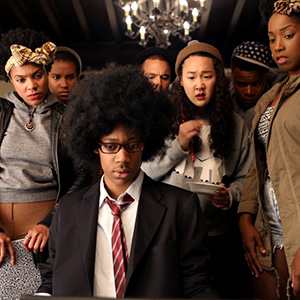

It’s a very good thing Justin Simien’s Dear White People was made—it gets in there where the dirt is. Among the talented newcomer cast are three standouts. Tessa Thompson is Samantha, a film studies firebrand with severe internal doubts. Lionel (Tyler James Williams) is a wary underdog with a sky-high afro. Samantha’s opposite, Coco (Teyonah Parris), is a vlogger (neologism shudder) who seeks popularity at all costs even if it means acting girly, self-deprecating and YouTube friendly.
At the lily-white Winchester University, Samantha’s show on the college radio station is chafing a lot of nerves. In the proud tradition of fraternity row movies, the administration is up in arms about her broadcasts. The worried dean of students is played by Dennis Haysbert—who gets to give full weight as an actor when telling off his legacy-student son Troy (Brandon P. Bell). Meanwhile, Lionel is seduced to the Light Side by the college newspaper, seeking an exposé of racism on campus.
You can be in favor of Dear White People and still notice that it’s a Harvard movie about Harvard problems. (The disgusting real-life incident spurring Dear White People took place at Dartmouth, and a few other schools.) Because of the tight budget, the fictional Winchester is shot to look like an Everycollege. The anxieties here aren’t universal to the college experience, such as hopes about getting tapped for the humor magazine, the aggravation of lazy legacies, and worries about the correct dining house. The Twitterish notes in Samantha’s broadcasts sometimes offer little distinction between serious racism and etiquette breaches. Writer/director Simien’s characters are all flawed, troubled and almost all duplicitous—the Latin motto of Winchester is “Know Thyself,” and nobody does here. That’s a sign of mature filmmaking. Samantha’s pronouncement, “Dear White People: don’t dance” is, ultimately, supposed to be funny. It exemplifies this film’s tendency to double-dip: decrying prejudice while celebrating exceptionalism.
Dear White People is a strong critique of pulp-TV trashiness, the banal ho-and-pimp masquerade the white kids love. Wisely it ridicules the assertion that America is post-racial after Obama’s twin victories. The film’s bravery and open ending is credible, despite the dead spots, and that woeful self-seriousness that poxes student wit. You can hit the nail on the head a hundred times and still have a rickety structure.
Dear White People
R; 100 min.



